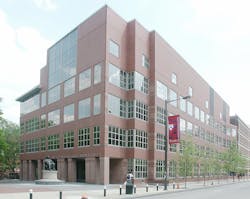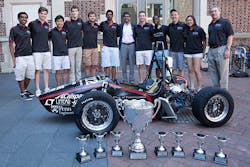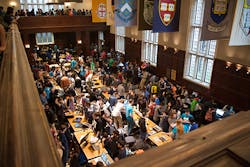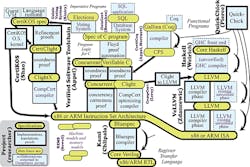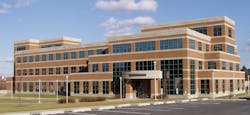University of Pennsylvania
First Place Finish for Penn’s Electric Race Car
Automotive engineering society SAE International hosts an annual series of racing events designed to spur creativity, innovation and problem solving in the next generation of engineering students. Its Formula SAE competition pits custom-built, high-performance racecars against one another. This year, over the weekend of June 17, it brought in more than a hundred teams, hailing from the United States, Canada, Mexico, Brazil, India and Japan. Read More
PennApps Brings World's Largest Collegiate Hackathon to Wells Fargo Cente
AStarted by students at the University of Pennsylvania’s School of Engineering and Applied Science in 2009, the world’s largest collegiate hackathon is now in its 12th iteration and is bigger and better than ever. Incubated in the Engineering campus’ classrooms, computer labs and hallways, the event has grown from a handful of Penn students to more than 2,000 from around the world, including students from Spain, Australia and Cameroon. Read More
Philly Materials Day 2015 from Felice Macera on Vimeo.
Materials Science and Engineering Solutions
Kids of all ages will learn about materials from Drexel and University of Pennsylvania faculty and students and our collaborating organizations and companies through hands-on demos, guest lectures, games, and even music!
Almost everything around you - the clothes you wear, the dishes you eat from, the computer you use, the bike you ride or the car you drive - is made of stuff. Materials science and engineering is the study of that stuff: what it's made of, how it works and what we can do with it.
2016 marks the sixth anniversary of Philly Materials Day focusing on hands-on activities related to five essential themes: communications, earth, energy, health, and sports.
Penn Computer Scientists Join NSF ‘DeepSpec’ Expedition to Eliminate Software Bugs
The transformative power of computer software is everywhere, from the smartphone apps that connect the world to the laptop programs that simplify daily tasks at work and home to the software hidden inside physical objects like automobiles and pacemakers that is crucial for their safe operation. However, the growing ubiquity of software has a dark side: when it misbehaves, the consequences can now range from the merely annoying, like computer crashes, to the disastrous, like car crashes.
University of Pennsylvania computer scientists are joining in one of the National Science Foundation’s flagship research initiatives, known as “Expeditions in Computing: The Science of Deep Specification,” or DeepSpec. The goal is to develop a better, more comprehensive way of approaching software design that will help eliminate bugs and vulnerabilities before they endanger users or become targets for hackers. Read More
Program Overview
Electrical Engineering
The broad umbrella of Electrical Engineering (EE) is involved in some part in almost all modern day technological advances and products in areas ranging across telephony, mobile and satellite communications, fiber optics, electrical power and machinery, instrumentation, computer systems, satellite systems, microelectronics, robotics, graphics, automatic control, and telecommunications to name but a few. The Electrical Engineering major is a flexible, broadbased program that provides a rigorous grounding in the analytical and experimental foundations of electrical engineering while allowing a student substantial flexibility in crafting an individualized program reflecting his or her interests and career goals.
Mechanical Engineering
The Mechanical Engineering and Applied Mechanics undergraduate curriculum has, over the last several years, been re-vamped to give our students the hands-on, real world lab work in addition to a strong background in theoretical knowledge. The addition of interactive, design-centered assignments is creating educational experiences that are preparing Penn's mechanical engineers for the problems they will solve in industry and research.
Computer Engineering
The enormous computational capabilities of modern computer technology offer the potential to create new applications and value that can be turned into concrete artifacts and services that improve our lives and create wealth. Computer Engineering (CMPE) is the discipline that designs and engineers computer systems from digital circuits, through compilers and runtime systems, to networking and world-wide distributed systems. As an engineering discipline, the computer engineer must appreciate the physical aspects of computations (energy, delay, area, reliability, costs) and be able to expertly navigate the multidimensional tradeoff space associated with implementing computations.
